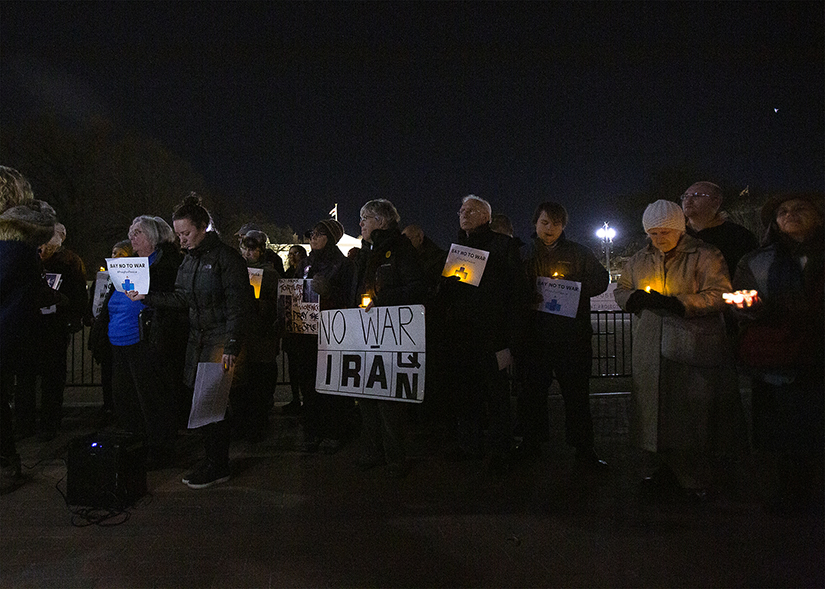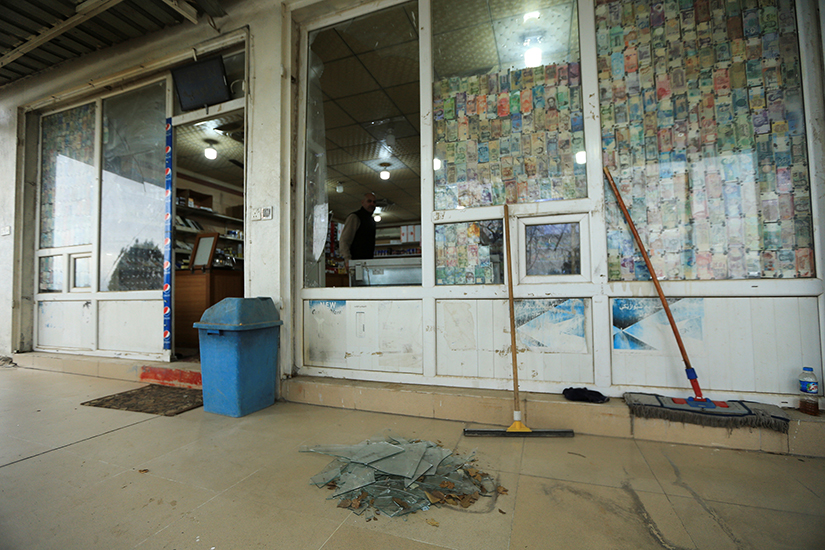TEHRAN, Iran — Following a U.S. airstrike that killed Iranian military commander Qassem Soleimani and an Iranian missile strike on military bases hosting American personnel, world and religious leaders called for dialogue to ease tensions between the two countries.
Hours after Iran launched more than a dozen ballistic missiles at two Iraqi bases, Archbishop Jose H. Gomez, president of the U.S. Conference of Catholic Bishops, issued a statement calling for urgent prayers “that our world’s leaders will pursue dialogue and seek  People gathered Jan. 6 near the White House in Washington during a candlelight vigil to call for peaceful solutions to rising tensions between the United States and Iran.Photo Credits: Tyler Orsburn | Catholic News Servicepeace.”
People gathered Jan. 6 near the White House in Washington during a candlelight vigil to call for peaceful solutions to rising tensions between the United States and Iran.Photo Credits: Tyler Orsburn | Catholic News Servicepeace.”
“In the face of the escalating tensions with Iran,” he stated, people should join him in “asking our Blessed Mother Mary, the Queen of Peace, to intercede, that Jesus Christ might strengthen the peacemakers, comfort the suffering, and protect the innocent and all those in harm’s way, especially the men and women in our military and diplomatic service.”
Iran’s missile launch — Jan. 8 in Iraq, late Jan. 7 in the U.S. — was said to be in retaliation for Washington’s targeted killing of Iran’s top militia commander, Maj. Gen. Qassem Soleimani, in Baghdad Jan. 3. The missiles hit the al-Asad airbase, which houses U.S. troops, and American and coalition forces in the northern Iraqi town of Irbil, in areas not heavily populated.
Chaldean Catholic Patriarch Louis Sako, responding to the U.S. drone attack that killed Soleimani, said “wisdom is required to avoid the ‘volcanic eruption’ we are about to face.”
Speaking during the Epiphany Mass in Baghdad Jan. 6, he said the current crisis resulted from the “upsetting escalation, as well as the emotional and impulsive decisions taken which lacked wisdom and the sense of responsibility.”
Speaking at St. Joseph Cathedral in the Iraqi capital, the cardinal addressed his words to world leaders to avoid a further escalation in violence, because, he said, “innocent people will be the fuel for such fire.”
He also invited Christians and Muslims to pray for the decision-makers to act wisely and consider the consequences of their strategies.
United Nations Secretary-General Antonio Guterres is renewing his “passionate appeal for peace,” stressing that the world cannot afford a war in the Persian Gulf.
U.N. spokesman Stephane Dujarric reiterated Jan. 8 the secretary-general’s appeal to world leaders to “stop escalation” and “re-start dialogue.”
The U.N. said Guterres is continuing contacts with key parties, stressing: “It is our common duty to make every effort to avoid a war in the Gulf that the world cannot afford.”
Pakistan’s prime minister has stressed the need to take immediate steps to de-escalate tensions in the Middle East. In a Twitter post, Imran Khan added that he is sending his foreign minister to Iran, Saudi Arabia and United States to meet with counterparts.
During his general audience Jan. 8, Pope Francis seemed to address the current situation in Iraq, offering “a warm welcome to the Arab-speaking pilgrims, especially those from Iraq, Lebanon, Syria and the Middle East.”
“In the saddest moments of our lives, in the most distressing moments and of trial, we must not be afraid and be bold as Paul was, because God watches over us, He is always close to us. May the Lord bless you all and always protect you from the evil one,” he said.
President Donald Trump addressed the nation Jan. 8, calling on the world to pursue a path to peace in the Middle East. He urged the nations that remained part of the so-called P5+1 pact that limited Iran’s development of nuclear weapons — the United Kingdom, France, China, Russia plus Germany — to “break away” from the deal and negotiate a new agreement that would allow Iran “to thrive and prosper.”
“We must all work together to making a deal with Iran that makes the world a safer and more peaceful place,” he said.
Iranian state television cited a statement by President Hassan Rouhani’s administration saying the country would not observe the nuclear deal’s restrictions on fuel enrichment, on the size of its enriched uranium stockpile and on its research and A man looked at a shattered glass window of a shop in the Iraqi province of Dahuk, Iraq, Jan. 8 after a missile launched by Iran against U.S.-led coalition forces. Iran attacked two bases in Iraq that house American troops with a barrage of missiles early Jan. 8 in retaliation for the U.S. killing an Iranian general Jan. 3.Photo Credits: Ari Jalal | Reuters development activities.
A man looked at a shattered glass window of a shop in the Iraqi province of Dahuk, Iraq, Jan. 8 after a missile launched by Iran against U.S.-led coalition forces. Iran attacked two bases in Iraq that house American troops with a barrage of missiles early Jan. 8 in retaliation for the U.S. killing an Iranian general Jan. 3.Photo Credits: Ari Jalal | Reuters development activities.
“The Islamic Republic of Iran no longer faces any limitations in operations,” a state TV broadcaster said.
In Iraq, meanwhile, lawmakers voted in favor of a resolution calling for an end to the foreign military presence in the country, including the estimated 5,200 U.S. troops stationed to help fight Islamic State extremists. The bill is subject to approval by the Iraqi government but has the backing of the outgoing prime minister.
In his address Jan. 8, President Trump also called on NATO to “become much more involved” in Middle East affairs, without elaborating on how that could be accomplished.
Pointing to the development of new weapons systems, Trump said the U.S. was prepared to defend Americans in the region, but that military action would not be the nation’s first response. “The fact that we have this great military equipment does not mean we want to use it,” he said.
He announced, again without detail, that new economic sanctions would be sought against Iran with the goal of ending the conflict in the region.
Iraqi Christians pray attacks by U.S., Iran will ease and tensions will decrease
By Dale Gavlak | Catholic News Service
AMMAN,
Jordan — Iraqis hope the violent attacks by the U.S. and Iran will ease
and that moves to decrease tensions will take hold, said an Iraqi
archbishop.
Chaldean Catholic Archbishop Yousif Thomas Mirkis of
Kirkuk, Iraq, repeated the overarching concern of the majority of
Iraqis, regardless of their religious affiliation: that foreign troops
stop using their shattered homeland as a battlefield to settle scores.
On
Jan. 8, Iran launched more than a dozen ballistic missiles at two Iraqi
bases in what it said was retaliation for Washington’s targeted killing
of Iran’s top militia commander, Maj. Gen. Qassem Soleimani, in Baghdad
Jan. 3. The missiles hit the al-Asad airbase, which houses U.S. troops,
and American and coalition forces in the northern Iraqi town of Irbil,
in areas not heavily populated.
“We haven’t heard anything about
lives lost. Maybe it can stop here — the revenge,” Archbishop Mirkis
told Catholic News Service by phone Jan. 8. “The revenge was in all the
speech of yesterday. … Now, that it is done, let us go to negotiate.”
Iran
called Soleimani’s killing an “act of war” and “state terrorism,” and
vowed “hard revenge.” Soleimani is believed to have been responsible for
hundreds of U.S. service member deaths in Iraq. He was also Iran’s main
strategist in the Syrian conflict.
American officials said there
were no initial reports of casualties, but the strikes’ impact was being
assessed. Analysts expressed hope that the crisis can now be defused,
with Tehran showing it has retaliated over Soleimani’s killing, while
Washington may shrug off the limited nature of strikes.
“My
anxiety was real,” Archbishop Mirkis said, referring to remarks he made
earlier about the deep fears Iraqis share. They hate the fact that the
United States and Iran are settling their differences on Iraqi soil and
view this recent escalation between the two powers as very dangerous for
their people.
“We are fed up with all kinds of troubles and war.
We don’t want this anymore. Especially, the demonstrations in Baghdad
are telling those who are with Iran or with America: ‘Let us live in
peace,’” Archbishop Mirkis said, underscoring the demand by protesters
to end Iranian influence in their country. Iraq’s parliament, minus
absent Sunni Muslim and Kurdish lawmakers, voted Jan. 5 to expel
American troops from Iraq.
The archbishop and other Catholic
leaders, included Iraqi Chaldean Catholic Patriarch Louis Sako,
repeatedly have appealed for an immediate de-escalation of tensions and
for countries to stop using Iraq as a battlefield.
“We have enough
of wars,” Archbishop Mirkis emphasized. “Since I am born, some 70 years
ago, I have seen only wars, only rebellion, only revenge and without
peace. These (actions) have completely destroyed our country.”
“We have nothing else to do, only pray,” he said.